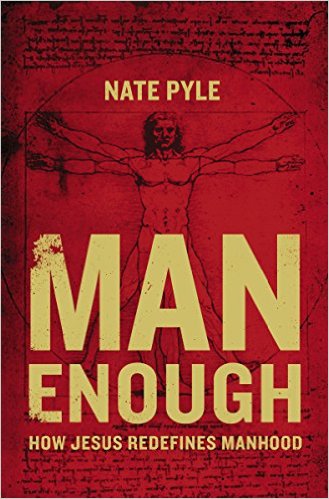Masculinity has struggled lately with what it’s definition is. From the entrepreneurial giant, to the rugged lone outdoor hunter, to the athleticly infused extreme sports junkie, to the effiminate “metrosexual”, men often don’t know who they are or what they should be. They often play the part of what they think they should be. Author Nate Pyle was in this predicament. As a young pastor, he admits that he didn’t really “feel” like a man until he was 31 years old, and that only occurred when he realized that he spent too much time putting on the "good man" show and was lonely as a result. He makes a great insight that “…more often than not, defined by what it is not rather than by what it is." "Man Enough: How Jesus Redefines Manhood" is a result of this journey, outlining our misconceptions and pointing us back not to a “true man”, but a “true human”, who is Jesus.

What I really like about this book is how Pyle takes a historical look at masculinity through the ages, showing how it has changed over time. It was really interesting to note how the definition of masculinity began to shift more as a result of the American revolution. “Rather than being defined by owning land and embodying certain values, a man began to be seen as someone who was independent, useful, heroic, and industrious.” This is where the term “breadwinner” started to gain traction, as well as the stigma that if you can’t provide for your family, then you aren’t a man. The weight of this view can be particularly heavy on the stay at home dads out there today. Pyle also goes back to the bible and notes how we often favor the “strong” heroes, like David. In doing so, we often forget that it wasn't Esau, the strong, hairy, older brother that spent the day outside hunting, but Jacob, the one who stayed at home all day with his mother, whom God chose to build his nation through.
So how are we to identify what manhood is? Pyle takes a step back from manhood by first looking at biblical passages that identify the traits of elders outlined by Paul: above reproach, faithful to his wife, temperate, self-controlled, respectable, hospitable, gentle, good managers of the family, lovers of good, upright, holy, diciplined, holding firmly to the truth of faith. Pyle notes that most of these characteristics are virtues women should seek to have as well. Additionally, how often do we celebrate the gentleness of a man? Pyle doesn’t do this to call into question what biblical manhood is, or to suggest a “genderless Christianity.” “Rather, my hope is that men and women are encouraged to grow into these good and right biblical characteristics apart from a culturally constructed gender ideal. For example, is there room in the church for a man to be gengle in a way that is true to his personality without being seen as an effeminate version of a man? Can a man hate violence and be a pacifist and still be considred a man in the church? Can a man not fight back without having to prove in other ways that he is a man? Can a man enjoy the arts, be moved to tears by music, be present to his emotions, and soft with his words and still be thought of as a man?"
The answer is yes, and all of this points back to Jesus. Jesus is more than a “man’s man” but the perfect example of what we should be as humans. Jesus called the children to him. Jesus turned over the tables (not in uncontrollable rage, but with controlled anger) in the temple. Jesus took up his cross to die for us. Jesus forgave us as he hung in agony with death approaching. Pyle points back to an idea that C.S. Lewis had about “dressing up” like Jesus. By acting as Jesus did, “prentending” to be like him early on when we don’t know better, we slowly become like Him, because the Holy Spirit is transforming us. We become the humble servant. We become willing to lay down our life for others. We become fully human. We embody all of the virtues Jesus has, even those that seem “not manly” in today’s standards.
In the end, I don’t think Nate Pyle gives us a straight definition of what manhood is. If anything, he shows us that our manhood is found in being like Jesus. This gave me a lot of food for thought. Some things I had heard before, but a lot of things, especially the preconceived notions I had in my own mind about what made me a man, were challenged and left me thinking on what characteristics I am embodying in my own life. I think this paragraph describes it best:
Saying Jesus defines what it means to be a man is easy; actually defining manhood in light of Jesus is harder. Because which Jesus do we define men by? The warrior Jesus of Revelation 19 who figts his enemies by being willing to suffer at their hands? The servant Jesus who kneels down to wash feet? The whip-wielding Jesus who stands for truth and clears the temple? What about the Jesus who likens himself to a mother hen an weeps unashamedly over Jerusalem? Do we define masculinity by all of these? In a word — yes. Which makes definining manhood, according to Jesus, ridculously complex. Which might be the point.
This book provides more of a framework than a definition of what manhood is. It will give you the guidelines to think more about your own preconceptions and what may need to change. I definitely recommend it. I was fortunate to receive a preview copy of this book, but it will be available on Amazon at the end of September. You can pre-order it from here.